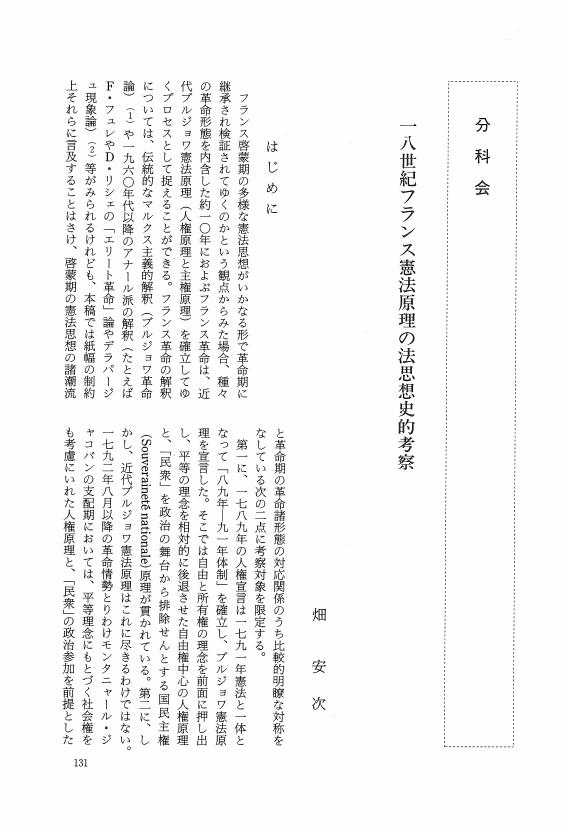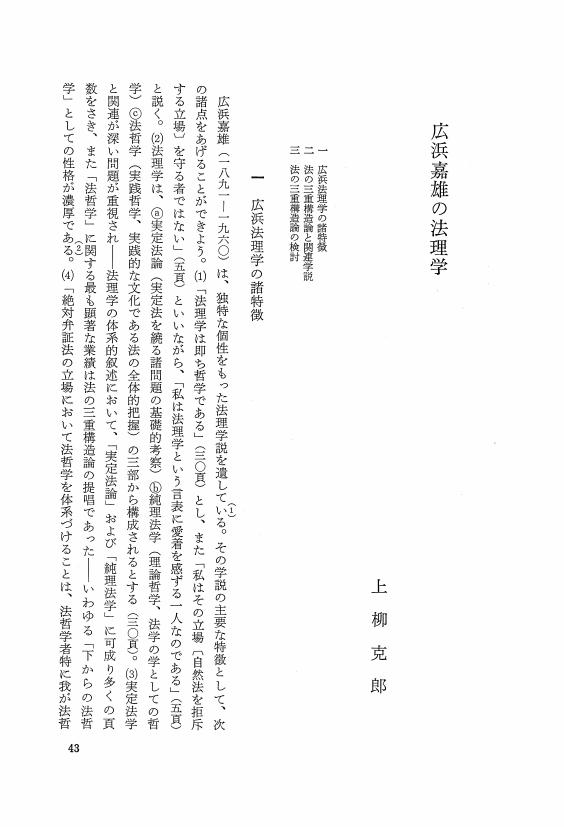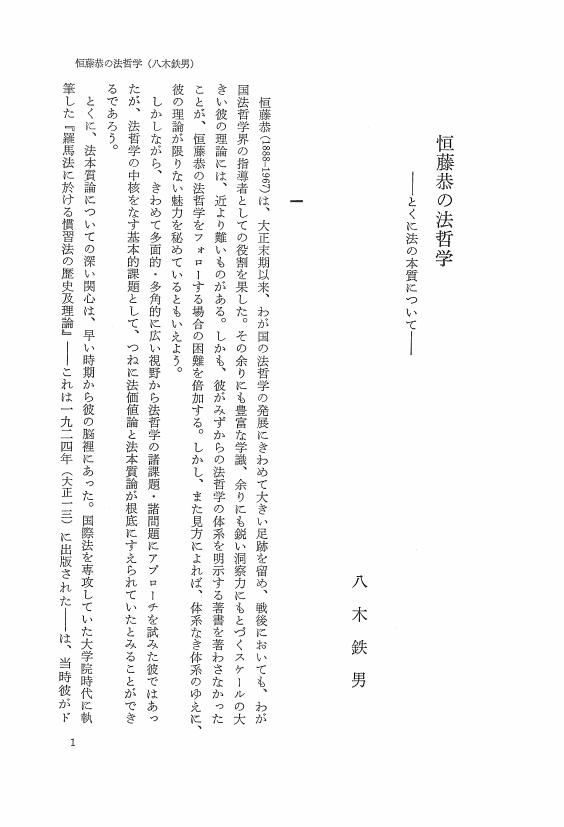3 0 0 0 OA 様相命題論理の意味論的モデルについて
3 0 0 0 OA 計算機科学における論理的検証
- 著者
- 五十嵐 滋
- 出版者
- 日本科学哲学会
- 雑誌
- 科学哲学 (ISSN:02893428)
- 巻号頁・発行日
- vol.7, pp.151-165, 1974-11-15 (Released:2009-05-29)
3 0 0 0 OA ヴェーバーと自然科学的決定論
- 著者
- 斎藤 博道
- 出版者
- The Philosophy of Science Society, Japan
- 雑誌
- 科学哲学 (ISSN:02893428)
- 巻号頁・発行日
- vol.3, pp.101-113, 1970-11-25 (Released:2009-12-07)
Understanding Weber's methodology of "Kulturwissenschaft" from the point of view of the history ofIdeas, we can not grasp it without reference to Marxism and Scientific determinism at the end of 19th century.It is not so hard to find papers that treat his methodology in comparison with Marxism, however, it is hard to find papers that attempt to describe what attitude he had toward scientific determinists ; Comte, Mach, Solvey, Ostwald.So the paper attempts to clarify this problem through Weber's article" » Energetische » Kulturtheorien" in which he argued on scientific determinism.
3 0 0 0 OA フランソワ.エワルドにおける「リスクの法哲学」
- 著者
- 西迫 大祐
- 出版者
- 日本法哲学会
- 雑誌
- 法哲学年報 (ISSN:03872890)
- 巻号頁・発行日
- vol.2006, pp.243-250,257, 2007-10-30 (Released:2010-12-16)
- 参考文献数
- 31
The concept of risk occupies centre-stage in debates about individual and social responsibilities. In this paper, we examines the work of Francois Ewald, who analyses risk and responsibilities within the French codified tradition, to show the questions which the legal philosophy of 21st century has to answer.
3 0 0 0 OA リベラル・フェミニズムの二つの視点
- 著者
- 井上 達夫
- 出版者
- 日本法哲学会
- 雑誌
- 法哲学年報 (ISSN:03872890)
- 巻号頁・発行日
- vol.2003, pp.68-80,233, 2004-10-20 (Released:2008-11-17)
- 参考文献数
- 21
In this paper I argue for two claims: that liberal feminism can adequately capture the critical insights of the second-wave feminism so as to rescue the latter from its own self-defeating tendencies; and that the internal tension between the liberal and feminist perspectives of liberal feminism generates important issues that must be addressed to reinforce feminism and to deepen liberalism. In the fist section I defend the first claim by showing the following points. The second -wave feminist critique of the public/private dichotomy is based on the doctrine that the personal is political, which must be complemented by the liberal tenet that the personal is personal for everyone, in order to protect against “private” and social pressures the autonomy and equal status that women have as individuals. The anti-essentialist deconstruction of gender, another secondwave feminist insight, must be coupled with the liberal commitment to critical morality based on justice and human rights to get out of the trap of comprehensive deconstructionism that undermines the feminist reformative vigor. In the second section I substantiate the second claim by comparing Ayako Nozaki's conception of liberal feminism and mine. Nozaki attempts to reconstruct liberalism from a feminist perspective by incorporating Hannah Arendt's conception of equality and Amartya Sen's capability-based approach to distributive justice into her theory. I argue that her feminist concerns can be more adequately captured and defended from a liberal perspective in which the universalistic idea of justice and resource-based approach to distributive
3 0 0 0 OA ホームズの名推理 C・S・パース・O・W・ホームズ・実在論的真正プラグマティズム
- 著者
- 金井 光生
- 出版者
- 日本法哲学会
- 雑誌
- 法哲学年報 (ISSN:03872890)
- 巻号頁・発行日
- vol.2001, pp.167-176, 2002-10-30 (Released:2008-11-17)
- 参考文献数
- 30
3 0 0 0 OA 法命題の正当化と根元的規約主義—市場への法規制を素材にして—
- 著者
- 山田 八千子
- 出版者
- 日本法哲学会
- 雑誌
- 法哲学年報 (ISSN:03872890)
- 巻号頁・発行日
- vol.2001, pp.114-123, 2002-10-30 (Released:2008-11-17)
- 参考文献数
- 19
3 0 0 0 OA ドイツ法的思考の形式について
- 著者
- 山田 晟
- 出版者
- 日本法哲学会
- 雑誌
- 法哲学年報 (ISSN:03872890)
- 巻号頁・発行日
- vol.1960, pp.1-28, 1961-08-30 (Released:2009-02-12)
- 参考文献数
- 44
3 0 0 0 OA 「社会契約」の隠された仕組み ド・マンのルソー論にふれて
- 著者
- 石前 禎幸
- 出版者
- 日本法哲学会
- 雑誌
- 法哲学年報 (ISSN:03872890)
- 巻号頁・発行日
- vol.1991, pp.143-150, 1992-10-30 (Released:2008-11-17)
- 参考文献数
- 19
3 0 0 0 OA 機能主義と社会統合・文化 H・ヘラーの法原則論を手がかりに
- 著者
- 大野 達司
- 出版者
- 日本法哲学会
- 雑誌
- 法哲学年報 (ISSN:03872890)
- 巻号頁・発行日
- vol.1990, pp.133-141, 1991-10-30 (Released:2008-11-17)
- 参考文献数
- 5
3 0 0 0 OA 一八世紀フランス憲法原理の法思想史的考察
- 著者
- 畑 安次
- 出版者
- 日本法哲学会
- 雑誌
- 法哲学年報 (ISSN:03872890)
- 巻号頁・発行日
- vol.1989, pp.131-140, 1990-08-25 (Released:2008-11-17)
- 参考文献数
- 33
3 0 0 0 OA 法と狭義の道徳
- 著者
- 森村 進
- 出版者
- 日本法哲学会
- 雑誌
- 法哲学年報 (ISSN:03872890)
- 巻号頁・発行日
- vol.1987, pp.74-92, 1988-10-25 (Released:2008-11-17)
- 参考文献数
- 22
3 0 0 0 OA 広浜嘉雄の法理学
- 著者
- 上柳 克郎
- 出版者
- 日本法哲学会
- 雑誌
- 法哲学年報 (ISSN:03872890)
- 巻号頁・発行日
- vol.1979, pp.43-60, 1980-10-30 (Released:2008-11-17)
- 参考文献数
- 26
3 0 0 0 OA 恒藤恭の法哲学 とくに法の本質について
- 著者
- 八木 鉄男
- 出版者
- 日本法哲学会
- 雑誌
- 法哲学年報 (ISSN:03872890)
- 巻号頁・発行日
- vol.1978, pp.1-27, 1979-10-15 (Released:2008-11-17)
- 参考文献数
- 58
3 0 0 0 OA ケルゼンの強制秩序概念と授権規範論
- 著者
- 菅野 喜八郎
- 出版者
- 日本法哲学会
- 雑誌
- 法哲学年報 (ISSN:03872890)
- 巻号頁・発行日
- vol.1977, pp.1-16, 1978-11-20 (Released:2008-11-17)
- 参考文献数
- 22
3 0 0 0 OA ルターの抵抗権思想 抵抗権否定をめぐる若干の問題
- 著者
- 伊藤 平八郎
- 出版者
- 日本法哲学会
- 雑誌
- 法哲学年報 (ISSN:03872890)
- 巻号頁・発行日
- vol.1975, pp.146-156, 1976-10-10 (Released:2008-11-17)
- 参考文献数
- 35
3 0 0 0 OA 法哲学と刑法理論 特にドイツ法学を中心として
- 著者
- 木村 龜二
- 出版者
- 日本法哲学会
- 雑誌
- 法哲学年報 (ISSN:03872890)
- 巻号頁・発行日
- vol.1968, pp.1-15, 1969-09-30 (Released:2009-02-12)
3 0 0 0 OA 司法権の独立と司法権のあり方
- 著者
- 横川 敏雄
- 出版者
- 日本法哲学会
- 雑誌
- 法哲学年報 (ISSN:03872890)
- 巻号頁・発行日
- vol.1956, pp.47-84, 1957-04-30 (Released:2009-02-12)
- 参考文献数
- 28
3 0 0 0 OA 常識と啓蒙の哲学者としてのウィトゲンシュタイン
- 著者
- 大谷 弘
- 出版者
- 日本イギリス哲学会
- 雑誌
- イギリス哲学研究 (ISSN:03877450)
- 巻号頁・発行日
- vol.40, pp.37-52, 2017-03-20 (Released:2018-07-25)
- 参考文献数
- 32
According to a commonplace view about the later Wittgensteinʼs philosophical method, a truly critical stance in philosophy is incompatible with the respect for common sense that Wittgensteinʼs official metaphilosophy endorses. Against this idea, I will claim that these are compatible. Especially, I will argue that (i) the role of common sense in Wittgensteinʼs philosophy is no more than to offer models for clarifying various philosophical utterances, and (ii) Wittgensteinʼs philosophy is truly critical in that it examines our framework of thoughts including common sense, so that Wittgenstein can be properly called a philosopher of common sense and enlightenment.
3 0 0 0 OA 誇りはどのような志向性をもつのか ―ヒュームの情念論―
- 著者
- 岡村 太郎
- 出版者
- 日本イギリス哲学会
- 雑誌
- イギリス哲学研究 (ISSN:03877450)
- 巻号頁・発行日
- vol.39, pp.51-65, 2016-03-20 (Released:2018-03-30)
- 参考文献数
- 10
Many of our mental states are directed toward something or have an “intentionality”. In the Treatise of Human Nature, David Hume describes passions like pride as intentional. My aim is to interpret this intentionality of passions in an appropriate way. Many have interpreted it as an “extrinsic” property of passions, but they cannot explain some distinct characters of intentional passions. Criticizing these interpretations, a new interpretation has appeared, which understands intentionality as an “intrinsic” property of passions. This is a strong interpretation except for dismissing a passionʼs significant role: directing our cognition. Modifying this point, I offer an alternative “intrinsic” interpretation.














